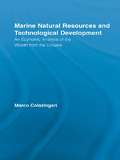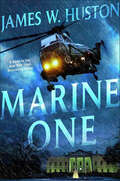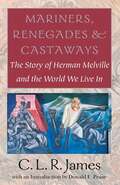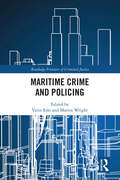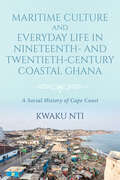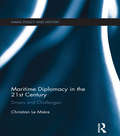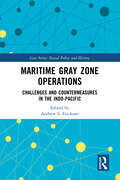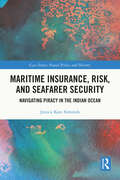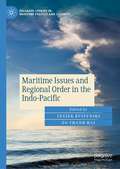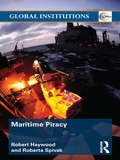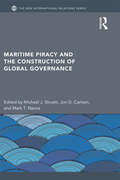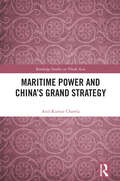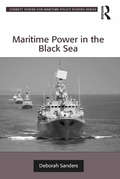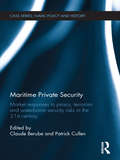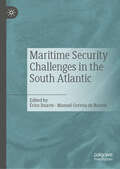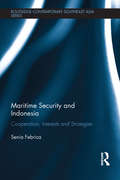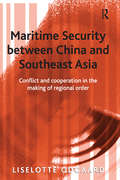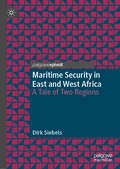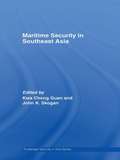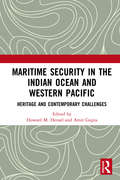- Table View
- List View
Marine Natural Resources and Technological Development: An Economic Analysis of the Wealth from the Oceans (Routledge Studies in Development and Society #Vol. 14)
by Marco ColazingariThis book offers a comprehensive and systematic examination of the issues involved within Ocean Economics. The oceans are the last frontier on Earth, and research and exploration are key to developing and enhancing global economic activity that is necessary to sustain a growing human population. Colazingari pinpoints the contentious issues relevant to oceans’ natural resources management and protection. He examines the cutting edge technology used for the exploration of the oceans’ living and non living resources (fisheries, bio-products, energy resources, mineral deposits) and identifies the significant emerging patterns that will determine the development of ocean economics in the future. Problems require timely action by politicians and policymakers at an international level, while scientists and researchers must assist in providing reliable information and investigating viable options. With writing that is straightforward but comprehensive, this book will appeal to professionals, academics, students, as well as anyone interested in marine environment.
Marine One
by James W. HustonAn attorney and Marine veteran must unravel a deadly conspiracy in this explosive legal thriller by a New York Times–bestselling author.The President rushes across the South Lawn through a pounding thunderstorm to board Marine One and fly to Camp David late at night. Advisors plead with him not to go—but he insists. He has arranged a meeting that only three people in his administration know about. But he never gets there. Marine One crashes into a ravine, killing all aboard . . .The government accuses the French helicopter manufacturer of killing the president. Senate Investigations and Justice Department accusations multiply as Mike Nolan, a trial attorney and a Marine Corps reserve helicopter pilot, is hired to defend the company against a wrongful death lawsuit brought by the First Lady.Now Nolan must find out what really caused Marine One to crash, and why the president threw caution aside to attend a secret meeting. To clear his client, Nolan must win the highest-profile trial of the last hundred years with very little working for him and many working against him—intent on stopping him at any cost . . .Praise for Marine One“Bestseller Huston . . . grabs the reader by the lapels with the opening sentence of the first chapter of this outstanding thriller. . . . This is nonstop legal suspense at its best.” —Publishers Weekly (starred review)“This gripping thriller opens with a bang. . . . The author smoothly combines the political-conspiracy and courtroom-drama formats, and he nicely explores the story’s fundamental moral quandary. . . . The book has echoes of Michael Crichton’s Airframe.” —Booklist
Mariners, Renegades and Castaways: The Story of Herman Melville and the World We Live In (Reencounters With Colonialism--New Perspectives on the Americas)
by C. L. R. JamesPolitical theorist and cultural critic, novelist and cricket enthusiast, C. L. R. James (1901 - 1989) was a brilliant polymath who has been described by Edward Said as "a centrally important 20th-century figure." Through such landmark works as The Black Jacobins, Beyond a Boundary, and American Civilization, James's thought continues to influence and inspire scholars in a wide variety of fields. "There is little doubt," wrote novelist Caryl Phillips in The New Republic, "that James will come to be regarded as the outstanding Caribbean mind of the twentieth century." In his seminal work of literary and cultural criticism, Mariners, Renegades and Castaways, James anticipated many of the concerns and ideas that have shaped the contemporary fields of American and Postcolonial Studies, yet this widely influential book has been unavailable in its complete form since its original publication in 1953. A provocative study of Moby Dick in which James challenged the prevailing Americanist interpretation that opposed a "totalitarian" Ahab and a "democratic, American" Ishmael, he offered instead a vision of a factory-like Pequod whose "captain of industry" leads the "mariners, renegades and castaways" of its crew to their doom. In addition to demonstrating how such an interpretation supported the emerging US national security state, James also related the narrative of Moby Dick, and its resonance in American literary and political culture, to his own persecuted position at the height (or the depth) of the Truman/McCarthy era. It is precisely this personal, deeply original material that was excised from the only subsequent edition. With a new introduction by Donald E. Pease that places the work in its critical and cultural context, Mariners, Renegades and Castaways is once again available in its complete form.
Mario Cuomo: Remembrances of a Remarkable Man
by William O'ShaughnessyA personal, behind-the-scenes look at a Democratic iconGovernor Mario Cuomo’s life and accomplishments are part of the public record, but in Mario Cuomo: Remembrances of a Remarkable Man, William O’Shaughnessy gives readers an exclusive and a deeply personal, behind-the-scenes look at the liberal Democratic icon. This poignant memoir, based on the author’s thirty-eight-year friendship with Governor Cuomo, portrays the spiritual journey of a man who played many roles: inspirational political leader, moral compass, spellbinding orator, gifted author, legal scholar, and loving father and grandfather. He was, in O’Shaughnessy’s words, one of the most articulate and graceful public men of the twentieth century.
Marion Butler and American Populism
by James L. HuntExploring the life and leadership of Populist Marion Butler (1863-1938), James Hunt offers new insight into the challenges of American reform politics. The son of North Carolina farmers and a graduate of the University of North Carolina, Butler displayed an early proclivity for agrarian reform. By age twenty-eight he led the Farmers' Alliance of North Carolina; two years later he was elected president of the national Alliance. Butler served in the U.S. Senate as a Populist from 1895 to 1901 and was chairman of the national Populist Party during the critical presidential elections of 1896 and 1900. In 1896 he helped engineer the remarkable collaboration in which Populist Tom Watson ran for vice president alongside Democratic presidential nominee William Jennings Bryan.Departing from earlier portrayals of Butler as a political opportunist, Hunt shows him to be a genuine reformer who upheld Populist tenets in the face of enormous opposition from Democrats, Republicans, and even members of his own party. A dynamic individual with enormous capacity to mobilize and motivate, Butler sought throughout his career to convert his reform ideals, through politics, into law. His long and, ultimately, losing efforts illuminate the limitations of Populism as an ideology and as a political movement.
Mariposa (Quantico #2)
by Greg BearThe world just keeps getting tougher and more complicated. America teeters on the edge of bankruptcy because of crushing foreign debt and an apparent savior, The Talos Corporation, delivers training for soldiers and security forces around the world, logistical support and badly-needed troops economically, but with a hidden cost that&’s both sinister and disturbing.The three rookie FBI agents who survived the challenges portrayed in Quantico, have gone their separate ways but seem fated to be drawn back together in an alliance against a surprising challenge for which no one seems prepared. Rebecca Rose is brought back from an extended sabbatical when the President is shot and her second-in-command is implicated in an horrific crime—and all the threads point deeper into Talos&’s secretive activities. Fouad Al-Husam, working undercover inside Talos, has uncovered and been forced to hide vital information of a takeover plot that threatens America&’s independence.Nathan Trace, victim of a violent incident in the Middle East, struggles with post-traumatic stress and seems to be recovering through participation in a treatment program, code-named Mariposa, which has unexpected side-effects that turn patients into brilliant, detached and sociopathic individuals—very smart and extremely deadly.Only a desperate combination of misfits and survivors can combat an apparently inevitable collapse of American organization that will lead to the fall of democracy.
Mariposa (Quantico #2)
by Greg BearThe world just keeps getting tougher and more complicated. America teeters on the edge of bankruptcy because of crushing foreign debt and an apparent savior, The Talos Corporation, delivers training for soldiers and security forces around the world, logistical support and badly-needed troops economically, but with a hidden cost that&’s both sinister and disturbing.The three rookie FBI agents who survived the challenges portrayed in Quantico, have gone their separate ways but seem fated to be drawn back together in an alliance against a surprising challenge for which no one seems prepared. Rebecca Rose is brought back from an extended sabbatical when the President is shot and her second-in-command is implicated in an horrific crime—and all the threads point deeper into Talos&’s secretive activities. Fouad Al-Husam, working undercover inside Talos, has uncovered and been forced to hide vital information of a takeover plot that threatens America&’s independence.Nathan Trace, victim of a violent incident in the Middle East, struggles with post-traumatic stress and seems to be recovering through participation in a treatment program, code-named Mariposa, which has unexpected side-effects that turn patients into brilliant, detached and sociopathic individuals—very smart and extremely deadly.Only a desperate combination of misfits and survivors can combat an apparently inevitable collapse of American organization that will lead to the fall of democracy.
Marital Privilege: Marriage, Inequality, and the Transformation of American Law (Yale Law Library Series in Legal History and Reference)
by Serena MayeriHow the privileged legal status of marriage survived decades of constitutional struggle and social change The United States is unusual among wealthy western nations in the degree to which the law channels public benefits and private economic resources through marriage. This remains so despite seismic changes in American family life in the last several decades of the twentieth century. During this period, marriage rates declined while divorce and nonmarital childbearing soared. Social movements—for racial and economic justice, women&’s and gay rights and liberation, civil liberties, and reproductive freedom—transformed the legal landscape. In Marital Privilege, Serena Mayeri tells the stories of parents and partners, activists and lawyers who challenged the legal primacy of marriage. They made innovative constitutional claims in courts and launched grassroots efforts to change laws and practices that penalized nonmarital relationships. But even though reforms eliminated the most visible discrimination against women, people of color, and children born to unmarried parents—and, eventually, against gay and lesbian Americans—marriage&’s privileged status endured. Because marriage increasingly correlated with education and wealth, marital primacy intensified racial and economic inequality. Marital Privilege explains how, as American law selectively incorporated principles of liberty and equality, the benefits of marriage became increasingly unavailable to those who needed them most.
Maritime Crime and Policing (Routledge Frontiers of Criminal Justice)
by Martin Wright Yarin EskiThis book offers a unique and scholarly perspective on a little-studied subject: maritime crime and policing. The seas and oceans cover 70 percent of the earth’s surface and 90 percent of world trade by volume travels by sea. Furthermore, the refugee crisis has produced an inflow of people attempting to find a better life, particularly in Northwest Europe and the UK, which has had an impact on the maritime domains of European ports. While there has been attention paid to the role of maritime policing by scholars in maritime security studies, little attention has been paid by criminologists and policing studies scholars. This book aims to fill this gap. Bringing together a range of international scholars, this book covers a variety of topics pertinent to maritime crime and its policing, such as fraud, piracy and armed robbery at sea, illegal and unregulated fishing, smuggling, people trafficking, illegal immigration, illegal dumping and pollution, arms trafficking, terrorism, and cargo theft. It brings together new perspectives on several key criminological themes such as transnational organised crime, criminalisation, and securitisation and provides a bold new direction for the landlocked discipline of criminology and policing studies. An accessible and compelling read, this book will be of interest to students and scholars of criminology, policing, sociology, politics, migration studies, and all those interested in the policing of the sea.
Maritime Culture and Everyday Life in Nineteenth- and Twentieth-Century Coastal Ghana: A Social History of Cape Coast
by Kwaku NtiThe communities along the coastline of Ghana boast a long and vibrant maritime culture. In the nineteenth and early twentieth centuries, the region experienced creeping British imperialism and incorporation into the British Gold Coast colony. Drawing on a wealth of Ghanian archival sources, historian Kwaku Nti shows how many aspects of traditional maritime daily life—customary ritual performances, fishing, and concepts of ownership, and land—served as a means of resistance and allowed residents to contest and influence the socio-political transformations of the era. Nti explored how the Ebusua (female) and Asafo (male) local social groups, especially in Cape Coast, became bastions of indigenous identity and traditions during British colonial rule, while at the same time functioning as focal points for demanding a share of emerging economic opportunities. A convincing demonstration of the power of the indigenous everyday life to complicate the reach of empire, Maritime Culture and Everyday Life in Nineteenth- and Twentieth-Century Coastal Ghana reveals a fuller history of West African coastal communities.
Maritime Diplomacy in the 21st Century: Drivers and Challenges (Cass Series: Naval Policy and History)
by Christian Le MièreThis book aims to redefine maritime diplomacy for the modern era. <P><P>Maritime diplomacy encompasses a spectrum of activities, from co-operative measures such as port visits, exercises and humanitarian assistance to persuasive deployment and coercion. It is an activity no longer confined to just navies, but in the modern era is pursued be coast guards, civilian vessels and non-state groups. As states such as China and India develop, they are increasingly using this most flexible form of soft and hard power. <P><P>Maritime Diplomacy in the 21st Century describes and analyses the concept of maritime diplomacy, which has been largely neglected in academic literature. The use of such diplomacy can be interesting not just for the parochial effects of any activity, but because any event can reflect changes in the international order, while acting as an excellent gauge for the existence and severity of international tension. Further, maritime diplomacy can act as a valve through which any tension can be released without resort to conflict. Written in an accessible but authoritative style, this book describes the continued use of coercion outside of war by navies, while also situating it more clearly within the various roles and effects that maritime forces have in peacetime. <P><P>This book will be of much interest to students of seapower, naval history, strategic studies, diplomacy and international relations.
Maritime Gray Zone Operations: Challenges and Countermeasures in the Indo-Pacific (Cass Series: Naval Policy and History)
by Andrew S. EricksonThis book addresses the issues raised by Chinese and North Korean maritime ‘gray zone’ activities in the Indo-Asia-Pacific region. For years, China has been harassing its neighbors in South China Sea and East China Sea, employing both coast guard and maritime militia forces, in the name of safeguarding Chinese sovereignty. This behavior is frequently characterized as constituting ‘gray zone’ activity. As the term suggests, this refers to a state of conflict that falls between peace and war. Interestingly, the Yellow Sea, which is geographically much closer to China than South China Sea or East China Sea, has been comparatively quiet. However, there is a danger that the PRC has the capability to replicate its gray zone activities in this area. Worse, North Korea has also been engaging in carefully-calibrated provocations there. This book addresses pressing questions about these activities and offers: (1) a conceptual framework to understand maritime gray zone operations and Beijing and Pyongyang’s approach, with an unprecedented focus on the Yellow Sea; (2) a comprehensive, fully updated fleet force structure for the PRC’s Coast Guard, together with projections regarding how the Coast Guard is likely to develop in the future; (3) an extensive organizational analysis of the PRC’s Maritime Militia that surveys the many units relevant to Yellow Sea operations, some revealed publicly for the first time; and (4) a detailed assessment of North Korean maritime ‘gray zone’ activities. This book will be of great interest to students of naval strategy, maritime security, Asian politics, and international security.
Maritime Insurance, Risk, and Seafarer Security: Navigating Piracy in the Indian Ocean (Cass Series: Naval Policy and History)
by Jessica Kate SimondsThis book explores the complex interplay between maritime insurance and piracy in the Indian Ocean, a crucial global trade route.Drawing on rich oral histories, this work delves into the lives of seafarers and insurance experts who confront the harsh realities of Somali piracy. Through a series of compelling case studies, including the notorious Maersk Alabama hijacking, the book sheds light on the evolving role of maritime insurers as they navigate the precarious waters of risk management. It highlights how these companies not only provide financial protection but also shape maritime security practices, transforming the sea into a managed space of governance. Spanning a geographical range from the Horn of Africa to global maritime hubs, the book emphasises the human cost of piracy and the often-overlooked experiences of those at sea. Bridging between historical cases and contemporary challenges, the book advocates a deeper understanding of the maritime landscape. Furthermore, by exploring the perspectives of seafarers, the book provides a unique insight into the emerging challenges faced at sea and the importance of safety in moments of maritime insecurityThis book will be of much interest to students of maritime security, naval policy, the history of insurance, and international relations.
Maritime Issues and Regional Order in the Indo-Pacific (Palgrave Studies in Maritime Politics and Security)
by Do Thanh Hai Leszek BuszynskiThis edited volume examines the political and security issues influencing and shaping the developing maritime order in the Indo Pacific. If focuses specifically on the impact of China’s maritime expansion upon the policies and strategies of the regional states as well as the major players. The chapters examine the interaction of these players, paying particular attention to Japan, as the originator of the Indo Pacific idea and promoter of security cooperation and regionalism. It also covers the responses of the ASEAN claimants, Vietnam, Malaysia, the Philippines as well as Indonesia, alongside the key players, India, the US and also the EU.
Maritime Piracy (Global Institutions)
by Robert Haywood Roberta SpivakMaritime Piracy is now a pressing global issue, and this work seeks to provide a concise and informative introduction to the area. Never truly having receded into a romanticized past, seaborne banditry’s rapid growth was stimulated by low risks and increasingly high rewards. Currently, obsolete, incomplete and complicating structures and norms of governance, together with advances in technology, enable a lucrative business model for pirates, as they effectively operate with impunity and claim increasing ransoms. Beginning with an overview and historical development of piracy and the relevant maritime governance structures, this work progresses to examine how 20th century shifts in global governance norms and structures eventually left the high seas open for predatory attacks on one of the worlds fastest growing and essential industries. Moving through contemporary debates about how to best combat piracy, the work concludes that the solution to a chronic global problem requires a long-term, holistic, and inclusive approach. Examining militaristic, legalist and humanitarian strategies and offering a critical evaluation of the various problems they bring, this work will be of great interest to all students and scholars of international law, international organizations and maritime security.
Maritime Piracy and the Construction of Global Governance (New International Relations)
by Jon D. Carlson Michael J. Struett Mark T. NancePiratical attacks have become more frequent, violent, costly and increasingly threaten to undermine order in the international system. Much attention has focused on Somalia, but piracy is a problem worldwide. Recent coordination efforts among states in South East Asia appear to have helped in the area, but elsewhere piracy has expanded. Interestingly, international law has long recognized piracy as a crime and provided tools for universal suppression, yet piracy persists. In this book, a handpicked group of leading experts in the field of International Relations use maritime piracy as a means to expose the incongruities in our understanding of global governance. Using broadly constructivist approaches to understand international actors’ responses to the challenges created by maritime piracy, the contributors question a number of myths and misconceptions around piracy and analyze the various ways that international law and organizations channel actors’ understandings of maritime piracy and their efforts to respond to it. In doing so, they expose some shaky foundations for IR theorists: how do we conceive of governance and legitimacy when they are delinked from the territorial aspect of the modern nation-state? What happens to prospects for cooperation when we get to the nitty-gritty questions of practice related to paying for trials, imprisoning and maintaining captured pirates, bearing the burden of policing sea-lanes, or even determining what constitutes a pirate? Does anyone have a monopoly on the legitimate use of force at sea, and how is that legitimacy constructed? Maritime Piracy and the Construction of Global Governance offers an improved theoretical understanding of the response of the international community to maritime piracy and broadens our understanding of the complex and sometimes countervailing motivations of all the actors involved, from international organizations and states down to the pirates themselves.
Maritime Power and China's Grand Strategy (Routledge Studies on Think Asia)
by Anil Kumar ChawlaThis book examines the role of maritime power in the ‘Chinese Dream’ of becoming the pre-eminent global power by 2049, a century after the establishment of the People’s Republic of China (PRC). The book argues that China seeks to use its maritime power as part of its quest to attain Great Power status by employing it to these areas: provide deterrence in the maritime domain; assure availability of resources; protecting its sea lines of communication; and in the economic domination of specific developing countries in Asia, Africa, Oceania and South America. Based on a careful examination of primary sources, especially China’s defence white papers and essential works on the topic by prominent Chinese military analysts and institutions, the author systematically unpacks interpretations and analysis of China’s evolving concepts of maritime power. The book traces China’s development and use of maritime power over its long-recorded history, especially from the time it became the People’s Republic of China (1950) to the present (2024) and links the country's maritime past with the present. A comprehensive and detailed study of the evolution of Chinese concepts of maritime power and how it forms an important part of the rejuvenation of the nation and the projection of China as a global power by mid-century, this book will be of interest to researchers studying Asian and Chinese Studies, Military Studies and policy makers at think tanks and government agencies.
Maritime Power in the Black Sea (Corbett Centre for Maritime Policy Studies Series)
by Deborah SandersMaritime Power in the Black Sea provides the first comprehensive assessment and evaluation of the comparative maritime power of the six littoral states in the Black Sea - Turkey, Russia, Ukraine, Georgia, Romania and Bulgaria. This book examines the maritime capabilities and assets of each of the six littoral Black Sea states and also considers the implications of the distribution of maritime power on both regional and international security. As such it makes an important contribution to the debate about what constitutes maritime power in the twenty first century and provides a thematic comparative study of the ability of each of the littoral states of the Black Sea to project maritime power.
Maritime Private Security: Market Responses to Piracy, Terrorism and Waterborne Security Risks in the 21st Century (Cass Series: Naval Policy and History)
by Patrick Cullen Claude BerubeThis book examines the evolution, function, problems and prospects of private security companies in the maritime sector. The private security industry continues to evolve after its renaissance over the past few decades, first in Africa, and later in Iraq and Afghanistan. Despite this, little academic work has been done to date on the role of private security in the maritime environment. This lacuna has become more pronounced as the threat of piracy, terrorism, and other acts of maritime political violence have caused littoral states and commercial entities alike to consider the use of private security to mitigate risks. Maritime Private Security is an edited volume specifically dedicated to combating the absence of academic research in this area. The discussion of this multi-faceted subject is organised into four key parts: Part I: The Historical and Contemporary Market in Maritime Private Security Services Part II: The Emergence of Private Anti-Piracy Escorts in the Commercial Sector Part III: The Privatization of Coast Guard Services Part IV: Private Security Responses to Maritime Terrorism This book will be of much interest to students of naval policy and maritime security, private security companies, piracy and terrorism, international law and IR in general.
Maritime Security Challenges in the South Atlantic
by Érico Duarte Manuel Correia de BarrosThis edited volume focuses on the South Atlantic regional and national issues with maritime implications: naval policy, security, transnational organized crime, and Europe's legacy and current influence. The work analyzes the positions in favor and against NATO’s extended role in the South Atlantic, the historical and current issues related to the Falklands War, the African national deficits, and initiatives to attend the regional maritime problems. Including contributions from Angolan, Brazilian, Senegalese, and US collaborators, the volume offers eclectic conceptual frameworks, rich historical backgrounds, updated data, original analysis models, and policy recommendations.
Maritime Security and Indonesia: Cooperation, Interests and Strategies (Routledge Contemporary Southeast Asia Series)
by Senia FebricaIndonesia is the largest archipelago state in the world comprising 17,480 islands, with a maritime territory measuring close to 6 million square kilometres. It is located between the two key shipping routes of the Pacific and Indian Ocean. Indonesia’s cooperation in maritime security initiatives is vitally important because half of the world’s trading goods and oil pass through Indonesian waters, including the Straits of Malacca, the Strait of Sunda and the Strait of Lombok. This book analyses Indonesia’s participation in international maritime security cooperation. Using Indonesia as a case study, the book adopts mixed methods to assess emerging power cooperation and non-cooperation drawing from various International Relations theories and the bureaucratic politics approach. It addresses not only the topic of Indonesia’s cooperation but also engages in debates across the International Relations, political science and policy studies disciplines regarding state cooperation. Based on extensive primary Indonesian language sources and original interviews, the author offers a conceptual discussion on the reasons underlying emerging middle power participation or non-participation in cooperation agreements. The analysis offers a fresh perspective on the growing problems of maritime terrorism and sea robbery and how an emerging power deals with these threats at unilateral, bilateral, regional and multilateral levels. The book fills a significant gap in literature on Indonesian foreign policy making in the post-1998 era. It provides the first in-depth study of Indonesia’s decision making process in the area of maritime security and will thus be of interest to researchers in the field of comparative politics, international relations, security policy, maritime cooperation, port and shipping businesses and Southeast Asian politics and society.
Maritime Security between China and Southeast Asia: Conflict and Cooperation in the Making of Regional Order
by Liselotte OdgaardArguing that security relations between China and Southeast Asia are profoundly affected by disputes over maritime space and territory in the South China Sea, the author demonstrates that the primacy of strategic competition over strategic partnerships promotes the emergence of a structure of deterrence, encouraging South East Asia to side with the United States to balance the military power of China. Combining the concepts of international disputes and order, the book establishes a framework designed to focus on periods of transition where international regulatory mechanisms are out of step with developments in the security environments of states. Features include: - Substantial evidence that strategic competition between the United States, China and South East Asia promotes stability. - A comprehensive account of military, diplomatic, economic, historical and legal aspects of security environments of states. Suitable for scholars and graduate students of international relations, international law, security studies, conflict management and regionalism, it will also be invaluable supplementary reading for undergraduate courses.
Maritime Security in East and West Africa: A Tale of Two Regions
by Dirk SiebelsThis book examines the nexus between maritime security and the ‘blue economy’ in sub-Saharan Africa. In recent years, maritime security issues have received increasing attention, but academic and policy-related discussions are largely limited to counter-piracy operations and, to a smaller extent, problems related to illegal fishing. This project offers an essential addition to the current academic and political discourse, combining a broad range of statistics with primary research and findings from more than 40 interviews with key stakeholders. It provides a unique analysis, recognizing that maritime security is not an end in itself but rather linked to economic and immaterial benefits of a more secure environment at sea.
Maritime Security in Southeast Asia (Routledge Security in Asia Series)
by Kwa Chong Guan John K. SkoganThis book confronts both the maritime security challenges and responses. In Southeast Asia, maritime security has, over the last twenty years, taken on a much greater importance, due to the Law of the Sea convention, which has resulted in a 200 nautical mile Exclusive Economic Zones (EEZs). As well as traditional security threats to maritime security, there has also emerged a range of non-traditional threat, such as those emanating from piracy and international terrorism that spill over into the maritime domain. Events such as September 11th, and the designation of Southeast Asia as a 'second front' in the war against terrorism, have resulted in the growing realization that multilateral security cooperation is required in order to better manage emerging security threats. Expert contributors to this book identify the nature of the maritime security problem and critically evaluate the various responses with an eye to improving the management of prevailing and emerging security threats. This book will be an invaluable resource to academics, policy analysts, legislators and students interested in security issues in Southeast Asia.
Maritime Security in the Indian Ocean and Western Pacific: Heritage and Contemporary Challenges
by Amit Gupta Howard M. HenselScholars and policy makers have traditionally viewed portions of the Indian Ocean and the Western Pacific as separate and discrete political, economic, and military regions. In recent years, however, a variety of economic, political, and military forces have made many within the academic community, as well as a growing number of national governmental leaders, change their perceptions and recognize that these maritime expanses are one zone of global interaction. Consequently, political, military, and economic developments in one maritime region increasingly have an impact elsewhere. <P><P> Analyzing and assessing the contemporary maritime challenges in the Indian Ocean and the Western Pacific, this valuable study highlights the current prospects for peace and security in what is rapidly becoming recognized as an integrated and interactive political, military-strategic, and economic environment. <P><P> This work will be of interest to researchers and policy makers involved in regional studies, as well as security studies, conflict resolution, military, and peace studies.
